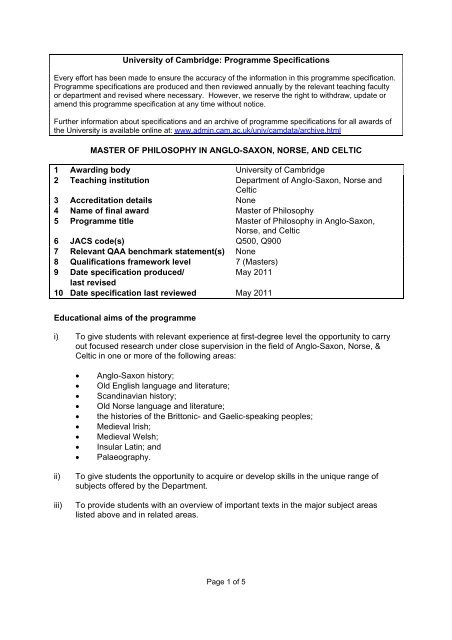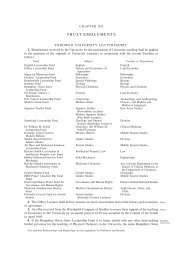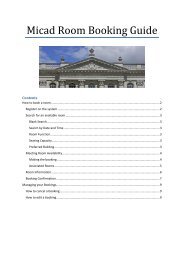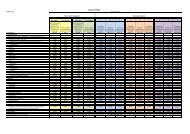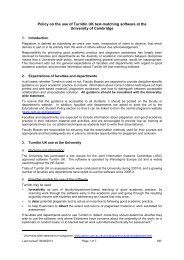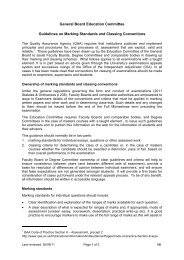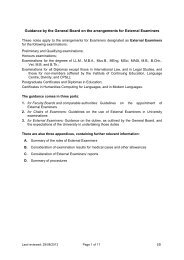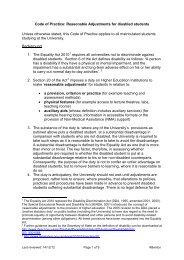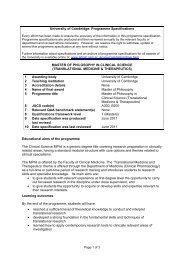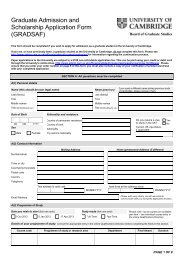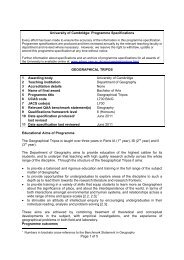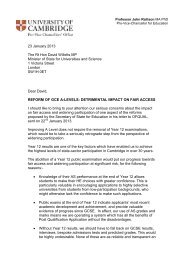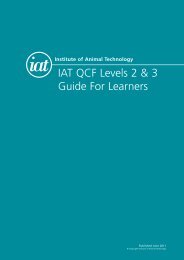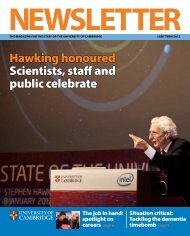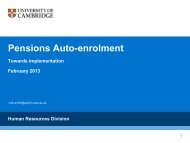Anglo-Saxon, Norse and Celtic - University of Cambridge
Anglo-Saxon, Norse and Celtic - University of Cambridge
Anglo-Saxon, Norse and Celtic - University of Cambridge
Create successful ePaper yourself
Turn your PDF publications into a flip-book with our unique Google optimized e-Paper software.
<strong>University</strong> <strong>of</strong> <strong>Cambridge</strong>: Programme Specifications<br />
Every effort has been made to ensure the accuracy <strong>of</strong> the information in this programme specification.<br />
Programme specifications are produced <strong>and</strong> then reviewed annually by the relevant teaching faculty<br />
or department <strong>and</strong> revised where necessary. However, we reserve the right to withdraw, update or<br />
amend this programme specification at any time without notice.<br />
Further information about specifications <strong>and</strong> an archive <strong>of</strong> programme specifications for all awards <strong>of</strong><br />
the <strong>University</strong> is available online at: www.admin.cam.ac.uk/univ/camdata/archive.html<br />
MASTER OF PHILOSOPHY IN ANGLO-SAXON, NORSE, AND CELTIC<br />
1 Awarding body <strong>University</strong> <strong>of</strong> <strong>Cambridge</strong><br />
2 Teaching institution Department <strong>of</strong> <strong>Anglo</strong>-<strong>Saxon</strong>, <strong>Norse</strong> <strong>and</strong><br />
<strong>Celtic</strong><br />
3 Accreditation details None<br />
4 Name <strong>of</strong> final award Master <strong>of</strong> Philosophy<br />
5 Programme title Master <strong>of</strong> Philosophy in <strong>Anglo</strong>-<strong>Saxon</strong>,<br />
<strong>Norse</strong>, <strong>and</strong> <strong>Celtic</strong><br />
6 JACS code(s) Q500, Q900<br />
7 Relevant QAA benchmark statement(s) None<br />
8 Qualifications framework level 7 (Masters)<br />
9 Date specification produced/<br />
May 2011<br />
last revised<br />
10 Date specification last reviewed May 2011<br />
Educational aims <strong>of</strong> the programme<br />
i) To give students with relevant experience at first-degree level the opportunity to carry<br />
out focused research under close supervision in the field <strong>of</strong> <strong>Anglo</strong>-<strong>Saxon</strong>, <strong>Norse</strong>, &<br />
<strong>Celtic</strong> in one or more <strong>of</strong> the following areas:<br />
• <strong>Anglo</strong>-<strong>Saxon</strong> history;<br />
• Old English language <strong>and</strong> literature;<br />
• Sc<strong>and</strong>inavian history;<br />
• Old <strong>Norse</strong> language <strong>and</strong> literature;<br />
• the histories <strong>of</strong> the Brittonic- <strong>and</strong> Gaelic-speaking peoples;<br />
• Medieval Irish;<br />
• Medieval Welsh;<br />
• Insular Latin; <strong>and</strong><br />
• Palaeography.<br />
ii)<br />
iii)<br />
To give students the opportunity to acquire or develop skills in the unique range <strong>of</strong><br />
subjects <strong>of</strong>fered by the Department.<br />
To provide students with an overview <strong>of</strong> important texts in the major subject areas<br />
listed above <strong>and</strong> in related areas.<br />
Page 1 <strong>of</strong> 5
These aims are achieved by:<br />
i) giving students the guidance necessary during the application process for them to be<br />
able to formulate a plausible research proposal, <strong>and</strong> to produce written work based on<br />
such a proposal to a strict timetable;<br />
ii) broadening their appreciation <strong>of</strong> the principal issues which shape the field <strong>of</strong> their<br />
dissertation topic, <strong>and</strong> encouraging them to develop insights which might form the<br />
basis <strong>of</strong> an original contribution to the field;<br />
iii) developing students' competence in bibliographical searching (including the use <strong>of</strong><br />
iv)<br />
information technology), <strong>and</strong> in the critical assessment <strong>of</strong> research in the field;<br />
providing teaching in a range <strong>of</strong> specialist linguistic, literary, historical <strong>and</strong><br />
palaeographical topics <strong>and</strong> giving students the opportunity to prepare written<br />
exercises for assessment in one or two <strong>of</strong> these areas, or to devise an essay topic in<br />
one <strong>of</strong> them;<br />
v) developing students' competence in contributing to a weekly text-based seminar, <strong>and</strong><br />
in presenting their own work <strong>and</strong> discussing the issues arising from it with an audience<br />
<strong>of</strong> peers <strong>and</strong> senior members <strong>of</strong> the Department.<br />
Programme outcomes<br />
Knowledge <strong>and</strong> underst<strong>and</strong>ing<br />
By the end <strong>of</strong> the course students should have:<br />
1. developed a deeper knowledge <strong>of</strong> their chosen area within <strong>Anglo</strong>-<strong>Saxon</strong>, <strong>Norse</strong> <strong>and</strong><br />
<strong>Celtic</strong> <strong>and</strong> <strong>of</strong> the critical debates within it;<br />
2. developed an underst<strong>and</strong>ing <strong>of</strong> critical debates which allows the evaluation <strong>of</strong> current<br />
research in their dissertation field.<br />
Teaching <strong>and</strong> Learning Methods<br />
(1), (2) <strong>and</strong> (3) above are developed through:<br />
• independent research <strong>and</strong> study;<br />
• in depth discussion with supervisor;<br />
• participation in research seminars.<br />
Assessment<br />
(1) <strong>and</strong> (2) above are assessed through the review <strong>of</strong> scholarship essay, take-home essay,<br />
dissertation <strong>and</strong> viva-voce examination.<br />
Skills <strong>and</strong> other attributes<br />
By the end <strong>of</strong> the course the students should have:<br />
3. demonstrated independent judgement based on their own research;<br />
4. acquired <strong>and</strong>/or consolidated linguistic, palaeographical or other scholarly skills;<br />
5. participated effectively in seminar discussions <strong>and</strong> made an oral presentation <strong>of</strong> their<br />
research;<br />
6. learnt how to timetable independent research to produce written work <strong>of</strong> a high st<strong>and</strong>ard<br />
to a strict deadline.<br />
Page 2 <strong>of</strong> 5
Teaching <strong>and</strong> Learning Methods<br />
(3) <strong>and</strong> (6) are developed through close interaction between supervisor <strong>and</strong> students<br />
throughout the year;<br />
(4) is developed through one or more written exercises in scholarly skills <strong>and</strong>, in many cases,<br />
through dissertation work;<br />
(5) is developed through preparation for <strong>and</strong> feedback from weekly text-seminars <strong>and</strong> the<br />
presentation <strong>of</strong> research in the Easter Term research forum.<br />
Assessment<br />
(3) is assessed by the review <strong>of</strong> scholarship essay, take-home essay <strong>and</strong> dissertation;<br />
(4) is assessed by one or more written exercises;<br />
(5) <strong>and</strong> (6) are formatively assessed.<br />
Programme structure<br />
July Viva-voce examination Examiners' meeting; degree<br />
(for c<strong>and</strong>idates continuing to PhD<br />
awarded<br />
<strong>and</strong>, at Examiners’ discretion<br />
for borderline cases)<br />
June Dissertation due (50%) Dissertations double-marked;<br />
(draft dissertation to supervisor 3 weeks earlier) all work to External Examiner<br />
April Take-home essay (10%) Double-marked<br />
March Written exercise(s) <strong>and</strong> essay due (15% each) Double-marked<br />
December Review <strong>of</strong> Scholarship due (10%)<br />
(draft to supervisor 2 weeks earlier)<br />
Double-marked; feedback<br />
given<br />
October Entry First Class or high 2(i) in first<br />
degree or equivalent required<br />
In addition<br />
October-March<br />
October-June<br />
Term)<br />
Weekly classes for written exercise(s)<br />
MPhil seminars (Michaelmas <strong>and</strong> Lent Terms); Dissertation Forum (Easter<br />
Requirements for the award <strong>of</strong> the degree<br />
The examination is divided into the following elements:<br />
Page 3 <strong>of</strong> 5
• review <strong>of</strong> scholarship in the student's dissertation field, not exceeding 5,000 words<br />
(10%);<br />
• written exercise in a scholarly skill (15%);<br />
• second written exercise or essay not exceeding 4,000 words (15%);<br />
• take-home essay not exceeding 3,000 words, on Michaelmas <strong>and</strong> Lent Term seminar texts,<br />
(10%);<br />
• a dissertation not exceeding 15,000 words (50%).<br />
In order to pass the MPhil, students must achieve an overall mark <strong>of</strong> 60. C<strong>and</strong>idates whose<br />
failure in one <strong>of</strong> the elements (review <strong>of</strong> scholarship, written exercise(s) or essay(s)) is<br />
marginal may be allowed to submit a dissertation if the Graduate Sub-Committee considers it<br />
possible that the c<strong>and</strong>idate will pass on aggregate. If failure in exercise(s) or essay(s) is<br />
more than marginal, or if there is failure in more than one element, c<strong>and</strong>idates will not<br />
normally be allowed to proceed towards the degree.<br />
The overall result in the MPhil is either a Pass or a Fail. There is no 'distinction' or other<br />
grade within the Pass category.<br />
Indicators <strong>of</strong> quality<br />
The Department <strong>of</strong> <strong>Anglo</strong>-<strong>Saxon</strong>, <strong>Norse</strong> & <strong>Celtic</strong> has been awarded 5* in the last two<br />
Research Assessment Exercises. External Examiners <strong>of</strong> the MPhil have consistently praised<br />
the quality <strong>of</strong> the provision <strong>of</strong> teaching <strong>and</strong> supervision. Between 8 <strong>and</strong> 14 students read for<br />
the MPhil each year <strong>and</strong> the pass rate approaches 100 %.<br />
Learning Support<br />
All students are members <strong>of</strong> a College as well as the Department <strong>and</strong> have access to<br />
learning support from both College <strong>and</strong> <strong>University</strong>. Each student has a supervisor who gives<br />
advice on planning the year's work <strong>and</strong> the dissertation in particular. Other members <strong>of</strong> the<br />
Department are also available to supervise essay topics in their area <strong>of</strong> specialisation or to<br />
assist with particular aspects <strong>of</strong> students' dissertation research.<br />
Documentation <strong>of</strong>fering specifications <strong>and</strong> guidance in relation to each element <strong>of</strong> assessed<br />
work is provided to students. Progress is monitored through the discussion with each student<br />
<strong>of</strong> draft sections <strong>of</strong> their dissertations by their supervisor <strong>and</strong> through submitted work: the<br />
review <strong>of</strong> scholarship exercise which is submitted at the end <strong>of</strong> Michaelmas Term is returned<br />
with written feedback at the beginning <strong>of</strong> Lent Term.<br />
The College Tutor for Graduates also plays a role in induction, support <strong>and</strong> guidance <strong>and</strong><br />
many Colleges appoint subject mentors for their graduate students.<br />
The Department's learning resources include a library which constitutes a useful working<br />
collection for MPhil students <strong>and</strong> access to computer facilities. Students are introduced to<br />
the <strong>University</strong> Library <strong>and</strong> its IT resources in one <strong>of</strong> the early sessions <strong>of</strong> the MPhil seminar.<br />
Evaluating <strong>and</strong> improving the quality <strong>and</strong> st<strong>and</strong>ards <strong>of</strong> learning<br />
The Faculty participates in the <strong>University</strong>'s quality assurance <strong>and</strong> enhancement system:<br />
Page 4 <strong>of</strong> 5
1 External Examining: the MPhil in <strong>Anglo</strong>-<strong>Saxon</strong>, <strong>Norse</strong> & <strong>Celtic</strong> has an External<br />
Examiner who submits a report which is considered by the Graduate Sub-Committee<br />
<strong>and</strong> the Degree Committee <strong>of</strong> the Faculty. Action in response to reports includes,<br />
where appropriate, revisions or adjustments to the programme <strong>and</strong> its delivery.<br />
2 Course approval: the Faculty is required to obtain the approval <strong>of</strong> the Board <strong>of</strong><br />
Graduate Studies <strong>and</strong> the General Board's Education Committee before any significant<br />
changes to courses are made. Following consideration <strong>of</strong> student feedback <strong>and</strong> the<br />
design <strong>of</strong> the teaching <strong>and</strong> assessment <strong>of</strong> the MPhil, a number <strong>of</strong> changes to the<br />
Regulations governing the MPhil in <strong>Anglo</strong>-<strong>Saxon</strong>, <strong>Norse</strong> & <strong>Celtic</strong> were proposed by the<br />
Graduate Sub-Committee in 2002 <strong>and</strong> approved by the Degree Committee <strong>of</strong> the<br />
Faculty, the Board <strong>of</strong> Graduate Studies <strong>and</strong> the General Board's Education Committee.<br />
3 General Board Internal Review: all the Faculty's activities, including the MPhil, were<br />
reviewed by the <strong>University</strong>'s General Board in 2006.<br />
In addition, MPhil students complete two end-<strong>of</strong>-term teaching evaluation questionnaires on the<br />
text seminar <strong>and</strong> an end-<strong>of</strong>-year open questionnaire on the MPhil in general. The results are<br />
analysed by the MPhil Convenor <strong>and</strong> presented for discussion to the Graduate Sub-Committee<br />
<strong>of</strong> the Department which either makes changes to the teaching programme directly or makes<br />
recommendations for substantive changes to the Degree Committee <strong>of</strong> the Faculty, <strong>and</strong> from<br />
there to the Board <strong>of</strong> Graduate Studies. The results <strong>of</strong> these deliberations are fed back to<br />
students through meetings <strong>of</strong> the Graduate Joint Academic Committee.<br />
At the end <strong>of</strong> the year, they also complete an annual supervision-evaluation form which<br />
provides feedback to supervisors <strong>and</strong> forms part <strong>of</strong> the appraisal process for members <strong>of</strong> the<br />
Department. Supervisors comment on each student's evaluation <strong>of</strong> their supervision <strong>and</strong> the<br />
forms are then returned to the MPhil Convenor for action as necessary. If difficulties arise<br />
the Faculty has a complaints procedure for graduate students to follow, which is set out in<br />
The Blue Book <strong>of</strong> Advice <strong>and</strong> Information for graduate students in English.<br />
One MPhil student is a member <strong>of</strong> the Department's Graduate Joint Academic Committee<br />
<strong>and</strong> represents the interests <strong>of</strong> MPhil students on that committee.<br />
Employment<br />
Preparation for employment is provided in the opportunities for acquisition <strong>of</strong> relevant skills<br />
outlined in Section 11.<br />
See also http://www.admin.cam.ac.uk/univ/gsprospectus/life/index.html#destinations<br />
Up to 60% <strong>of</strong> graduates <strong>of</strong> the ASNC MPhil go on to study for a PhD at <strong>Cambridge</strong> or other<br />
universities. In order to register for the PhD in <strong>Anglo</strong>-<strong>Saxon</strong>, <strong>Norse</strong> & <strong>Celtic</strong> at <strong>Cambridge</strong>,<br />
students must have achieved an overall mark in the MPhil <strong>of</strong> 70 or above, <strong>and</strong> 70 or above<br />
for the dissertation.<br />
Page 5 <strong>of</strong> 5


